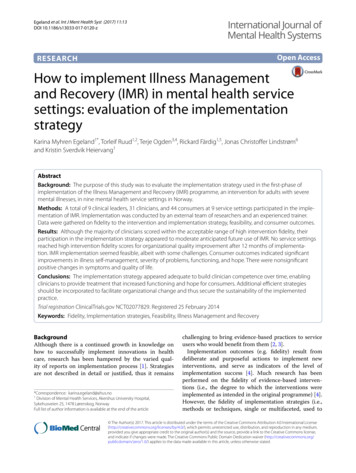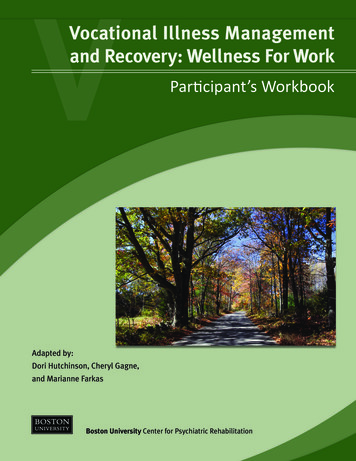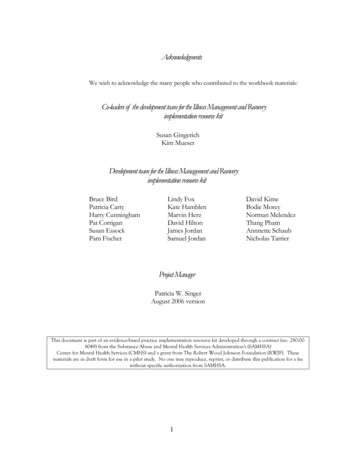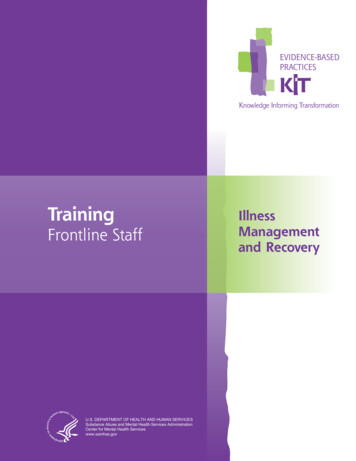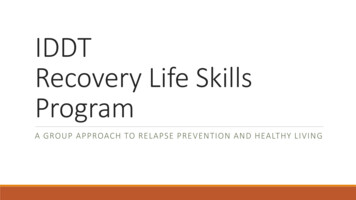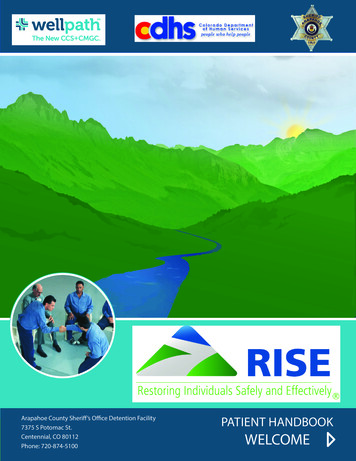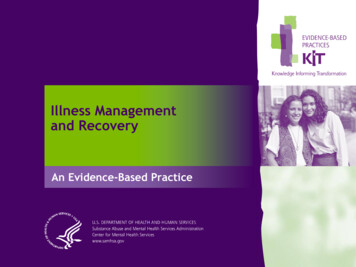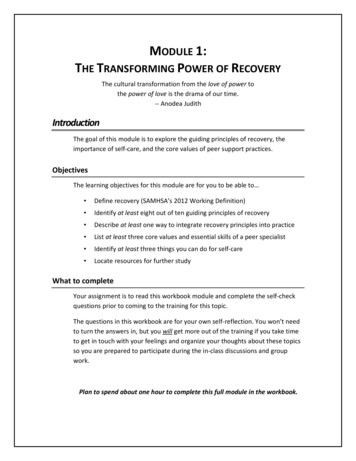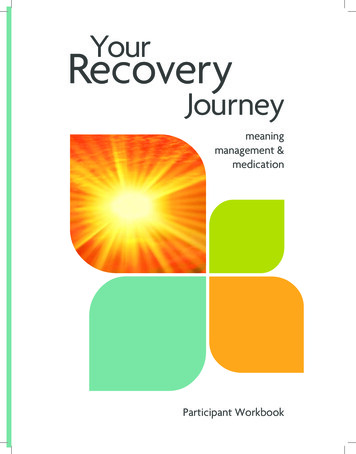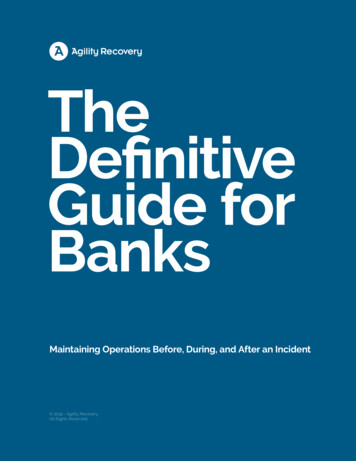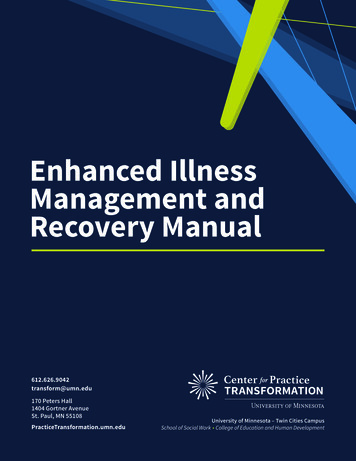
Transcription
Enhanced IllnessManagement andRecovery Manual612.626.9042transform@umn.edu170 Peters Hall1404 Gortner AvenueSt. Paul, MN 55108PracticeTransformation.umn.eduUniversity of Minnesota – Twin Cities CampusSchool of Social Work College of Education and Human Development
Enhanced Illness Managementand Recovery ManualSusan Gingerich, MSWIndependent Consultant and TrainerKim T. Mueser, Ph.D.Center for Psychiatric Rehabilitation, Boston UniversityPiper S. Meyer-Kalos, Ph.D.Center for Practice Transformation, University of MinnesotaMelinda Fox-Smith, MA, LADCLB Fox AssociatesTanya Freedland, MPS, LADCCenter for Practice Transformation, University of Minnesota 2018 Regents of the University of MinnesotaMaterials may not be reproduced.
AcknowledgementsWe would like to acknowledge allthe people who contributed to thismanual: Mary Brucciani, Mary Brunette,Adam Demers, Jessica Gallo, DorieMcClelland, Douglas Noordsy, JessicaOrange, and the staff at the Center forPractice Transformation. We would liketo extend special thanks to the clientsand practitioners who graciously sharedtheir experiences and provided valuablefeedback throughout the process.This manual was made possible in partby funds from the Adult Mental HealthDivision of the Minnesota Department ofHuman Services.DISCLAIMERThe views, opinions, and content of thispublication are those of the authors andcontributors and do not necessarily reflect theviews, opinions, or policies of the MinnesotaDepartment of Human Services. COPYRIGHT 2018 Regents of the University of MinnesotaMaterials may not be reproduced.RECOMMENDED CITATIONGingerich, S., Mueser, K.T., Meyer-Kalos, P.S.,FoxSmith, M., Freedland, T. (2018) Enhanced IllnessManagement and Recovery E-IMR) unpublishedmanuscript. Minnesota Center for Chemical andMental Health, School of Social Work, College ofEducation and Human Development, University ofMinnesota, St. Paul, MN.612.626.9042transform@umn.edu170 Peters Hall1404 Gortner AvenueSt. Paul, MN 55108PracticeTransformation.umn.eduUniversity of Minnesota – Twin Cities CampusSchool of Social Work College of Education and Human Development
Table of ContentsMODULE 1: Recovery StrategiesMODULE 2: Practical Facts about Mental Illness153MODULE 3: Practical Facts about Substance Use Disorders101MODULE 4: The Stress-Vulnerability Model135MODULE 5: Coping with Stress163MODULE 6: Building Social Support201MODULE 7: Using Medications Effectively239MODULE 8: Coping with Problems and Symptoms287MODULE 9: Healthy Lifestyles363MODULE 10: Developing a Plan for Staying Well425MODULE 11: Getting Your Needs Met in the Health Care System477 2018 Regents of the University of MinnesotaMaterials may not be reproduced.
MODULE 1Recovery StrategiesEnhanced Illness Management and Recovery“For me a better life quality includesa balance of good health, both physicaland mental, spiritual growth throughworship and fellowship, a challenging,rewarding job and meaningful social,personal and familial relationships.Recovery is a journey, not a destination.For me, recovery is a state of being;a feeling of sustainable wellness andcontinuous growth.”— JOHN C., writer, sculptor, designer in recovery from co-occurring disordersMODULE 1 Recovery Strategies 1
Questions to get us started:What does recovery from mental illness mean to you?What does recovery from substance use problems mean to you?Based on what recovery means to you, what changes would youlike to make in your life?How can you make those changes?We will cover 5 topicsin this Module:Reminder, setan Agenda:Topic 1:What is Recovery and What Helps Peoplein the Recovery Process?It is helpful to set an agendafor each session with yourpractitioner. Here is an examplebelow for each Enhanced IMRsession:Topic 2:Exploring Changes You Would Liketo Make in Your Life, PART 11. Review the last sessionTopic 3:Exploring Changes You Would Liketo Make in Your Life, PART 22. Check in on progress inspecific areas. This checklistmay be different each time.Topic 4:Identifying a Personal Recovery Goal andMaking Plans to Achieve it3. Learn informationabout a new topicTopic 5:Following Up on Your Goal and Solving Problems4. Summarize session anddecide on home practiceMODULE 1 Recovery Strategies 2
Topic 1What isRecovery andWhat HelpsPeople in theRecoveryProcess?This handout is about RecoveryStrategies. In it, you will learn to definerecovery in your own terms. You willalso explore different parts of your life toidentify areas you’d like to improve.We’ll start by looking at what recoverymeans— in substance use and inmental illness.This session will introduce twoimportant subjects to help you startcreating your own recovery plan:Each of these ideas will be describedin detail throughout this topic. Weencourage you to discuss these topicswith your E-IMR practitioner, or withother group members. Talking abouttopics can improve your understandingand your confidence for using theinformation in your life.Understanding recoveryThere is no “correct” definition ofrecovery from mental illness or recoveryfrom substance use problems. Eachperson can define recovery in theirown way—for both mental health andsubstance use issues. Some people thinkof recovery as a process, while othersthink of it as a goal or an end result. Somepeople focus on the positive effectsrecovery brings to their lives. To themrecovery means, “living the kind of lifeI want,” or “living a happy, healthy life.”Understanding recoveryMoving forward in therecovery processMODULE 1 Recovery Strategies 3
TOPIC 1 What is Recovery and What Helps People in the Recovery Process?Here are some more examples of howpeople have defined recovery:“Recovery from mental illness is notlike recovering from the flu. It’s aboutrecovering your life and your identity.”“ Being in recovery from substanceabuse means recognizing the negativeeffects alcohol and drugs have had onyou and your loved ones, and makinga choice not to use in order to reclaimyour life.”“ Recovery for me is having goodrelationships and feeling connected toothers. It’s about enjoying life.”“ For me, recovery is having a job andliving in my own apartment.”Let’s Talk About ItDo any of these definitions strikea chord with you?Which examples describe what isimportant to you?For many people, being in recovery meanshaving your symptoms well managed, sothat you can enjoy life and cope with thedaily highs and lows it brings. Here aresome more examples of how differentpeople look at recovery from substanceuse and mental health problems:“ Recovery is knowing that youcan’t control your own drinking anddrugging, and that you have to stop.That’s when my life really began.”“ I will know I have recovered when I amnot hospitalized anymore.”“To me, recovery means more thansimply not drinking. It’s about beinghealthy—taking care of my physicaland my mental health. Without that,I know I’m just a ‘dry drunk.’ I’m notliving a healthy life yet.”“Recovery means having moreimportant things to do than justfocusing on your problems: it’s a senseof purpose, or something you want toaccomplish.”Let’s Talk About ItTKE Y POINinePeople def heir owntrecovery in s.aypersonal wDo any of these aspects of recoveryhave special meaning for you?In what ways are recovery from mentalillness and recovery from substanceuse problems the same? How are theydifferent?What does recovery from each type ofproblem mean to you?MODULE 1 Recovery Strategies 4
TOPIC 1 What is Recovery and What Helps People in the Recovery Process?Moving forward in therecovery processPeople use a variety of differentstrategies to help themselves in therecovery process. You probably alreadydo things that help you in recovery.Read through the following examples ofrecovery strategies to learn what othershave done. Develop a social support system“It helps me to have friends andfamily I can do things with and talkthings over with. Sometimes I haveto work on these relationships andmake sure I stay in touch.” Have friends and family who don’tuse substances“I’ve found it’s important to havepeople in my life who don’t drink oruse drugs. Spending time with themgives me something better to dothan to use substances.” Stay active“The more I do to stay active duringthe day, the better things go. I makea list each day of what I want to do,including both fun things and workthings.” Express creativity“I like to write poetry. It’s a way ofexpressing my emotions and puttingmy experiences into words. It’s verysatisfying. Sometimes I share mypoetry with others. I like to readother people’s poems, too.” Be involved in self-help programsfor mental health, substance useproblems, or both“I belong to a support group forpeople with psychiatric symptoms.I feel comfortable there. Everyoneunderstands what I am goingthrough. They also have good ideasfor solving certain problems.”“I go to Alcoholics Anonymous(AA) meetings. I feel good when Igo there because people know meand support me. Everyone at AAmeetings has had problems drinking,so I know I’m not alone.”“I found a Dual RecoveryAnonymous (DRA) group that Ireally like and helps me. Being ableto share my experiences openly withother people with mental illness andsubstance use problems has been ahuge relief. Even more important hasbeen supporting and helping otherswith similar problems.”Examples continued on next page.MODULE 1 Recovery Strategies 5
TOPIC 1 What is Recovery and What Helps People in the Recovery Process? Be aware of the environment andhow it affects you“I concentrate much better in a quietenvironment. When things get noisy,I get distracted and get irritable. Ilike to seek out quieter places withfewer people involved.” Maintain physical health“I try to eat healthier foods, likemore fruits and vegetables, andexercise most days. It makes me feelbetter, both physically and mentally.When I eat junk food or don’t getany exercise, I feel sluggish anddon’t think as clearly.” Be in touch with spirituality Connect with nature“Going to the woods, a park, a lake,or the ocean makes all the differencein the world to me. I feel calm, andat one with everything around me—peaceful. Spending time in nature ona regular basis both relaxes me andre-energizes me.” Follow through withtreatment choices“I have chosen treatment thatincludes a stress managementgroup, supported employment,and taking medication. Followingthrough on these things makes mefeel strong, like I can handle my dailychallenges.”“Expressing my spirituality isessential to me. I belong to achurch, but I also find spirituality inmeditation and yoga.” Make time for fun“I need time for leisure andrecreation. I can’t work all the time,and using substances isn’t goodfor me. My partner and I like tosee a movie every Friday night. Wetake turns picking out what we willwatch.”MODULE 1 Recovery Strategies 6
TOPIC 1 What is Recovery and What Helps People in the Recovery Process?Make it Your OwnStrategies that Help People with RecoveryThe list below describes strategies that help people with recovery. Reviewthe list with your E-IMR practitioner. Check the strategies you are alreadyusing, and the ones you would like to develop further.Recovery StrategyI already usethis strategyI would like to trythis strategy ordevelop it furtherDevelop a social support systemHave friends and family who don’t use substancesStay activeExpress creativityBe involved in self-help programs for mental healthBe involved in self-help programs for substance use problemsBe involved in self-help programs for both substance use andmental health togetherBe aware of the environment and how it affects youMaintain physical healthBe in touch with spiritualityMake time for funConnect with natureFollow through with treatment choicesLet’s Talk About ItWhich strategies do you already use? Which ones would you like to try?What step could you take in the coming week to develop a new recovery strategy?When and where would you like to take that step?What resources or information do you need to take this step?Is there someone who could help you take this step? 2018 Regents of the University of MinnesotaMaterials may be reproduced for non-commercial, educational use only under Creative CommonsAttribution-Non Commercial 4.0 International License.MODULE 1 Recovery Strategies 7
TOPIC 1 What is Recovery and What Helps People in the Recovery Process?KEY POINTEach person findshis or her ownpath to recovery.Make it Your OwnCreate a Plan for New Recovery StrategiesUsing your answers in the Let’s Talk About It activity on page 7, pick a newrecovery strategy to try. Then, fill in the steps below to make a plan to trythis new recovery strategy.My plan for putting a recovery strategy into practice:STEP 1.STEP 2.STEP 3.STEP 4. 2018 Regents of the University of MinnesotaMaterials may be reproduced for non-commercial, educational use only under Creative CommonsAttribution-Non Commercial 4.0 International License.MODULE 1 Recovery Strategies 8
TOPIC 1 What is Recovery and What Helps People in the Recovery Process?Home PracticeWhat is Recovery and What Helps People in the Recovery Process?Choose one of the following optionsto practice or make one up.Make a plan for homepractice this week:OPTION 1:Take a step in your plan to try a newrecovery strategy.OPTION 2:Share with a friend or family memberwhat recovery from mental illnessand recovery from substance usemean to you. Get the other person’sviewpoint. Do they think recoveryfrom mental illness and recoveryfrom substance use problems aredifferent?What I will doWhenWhereWith whom“You haveto practicesomethingtomake it yourown!” 2018 Regents of the University of MinnesotaMaterials may be reproduced for non-commercial, educational use only under Creative CommonsAttribution-Non Commercial 4.0 International License.MODULE 1 Recovery Strategies 9
TOPIC 1 What is Recovery and What Helps People in the Recovery Process?KEY POINTS Topic 1What is Recoveryand What HelpsPeople in theRecovery Process?People define recovery in theirown personal ways.Each person finds his or herown path to recovery.MODULE 1 Recovery Strategies 10
Topic 2ExploringChanges YouWould Like toMake in YourLife, PART 1In Topic 1, you learned differentviewpoints for defining recovery frommental health and substance useproblems. You also talked about whatrecovery from these disorders means toyou. As you continue working towardsyour own personal recovery, it’simportant to decide which changes youwould like to make in your life. Basedon the changes you want to make, youcan set goals, and figure out steps forachieving your goals.This session will introduce twoimportant subjects to help you explorewhich changes you would like to makein your life:Understanding what’simportant to youHow satisfied are you withdifferent areas of your life?Each of these subjects will be describedin detail in this session. We encourageyou to discuss these topics with yourE-IMR practitioner, or with other groupmembers. Talking about topics canimprove your understanding and yourconfidence for using the information inyour life.Understanding what’simportant to youKnowing what is important to you andthe things that you value in life can helpyou decide which areas of your life youwould like to make changes in. It maytake you some time to figure out howyou would like your life to be different.The information in this handout can help.Let’s Talk About ItImagine how your life would bedifferent if you didn’t have any ofthe mental health or substance useproblems you have experienced.What would you be doing thatyou’re not doing now?How would areas of your life suchas work, school, close relationships,or things you do for fun be different?MODULE 1 Recovery Strategies 11
TOPIC 2 Exploring Changes You Would Like to Make in Your Life, PART 1How satisfied are you withdifferent areas of your life?As you figure out what changes you want to begin making, it can help to reviewdifferent areas of your life. The questions in the next few pages of this topic will helpyou do this. As you examine each life area, consider the following questions: What do I like about my life in this area?What is going well in this area? What do I not like about this area in my life?What is not going well in this area? Overall, am I satisfied or dissatisfied with how thingshave been going in this area of my life? How would I like things to be differentin this area of my life?With your E-IMR practitioner, first read throughand discuss the description of each life area on thefollowing pages.KEY POINTUnderstanding yoursatisfaction with lifeand areas that areimportant to you isthefirst step in makingchanges that willimprove your recovery.On pages 17-18 you will find the Satisfaction with Areasof My Life Worksheet, which lists 14 life areas in total.After you discuss each life area, you can turn to theworksheet and mark how satisfied you are with this lifearea, and make notes about what you’d like to change inthis area. In this session, we will cover the first 7 itemson the worksheet. The remaining areas (items 8 to 14)will be covered in our next session.Please remember to bring the Satisfaction with Areas ofMy Life Worksheet with you to the next session.MODULE 1 Recovery Strategies 12
TOPIC 2 Exploring Changes You Would Like to Make in Your Life, PART 11. Friendships2. Family RelationshipsThink about the friends you have had inyour life—when you were younger, asyou grew up, and as an adult. Think ofold friends and new friends, co-workers,neighbors, people you know from aprogram, and people you have usedalcohol or drugs with.Think about your parents, siblings,children, grandparents and otherextended members of your family.Consider how often you see individualfamily members and how often you gettogether as a group. What kind of friendsdo you have now? What do you do together? In what ways would you like yourfriendships to be different? ow satisfied are you withHyour friendships? Are therechanges you would like to make?Write your answers on page 17. W hat kinds of things do you dowhen you get together with familymembers? Do you get along, or argue? Who in your family would you liketo see more often? What are thebarriers to seeing them? What has happened in the past thatcaused tension, or made it hardfor you to get together with familymembers? I n what ways would you like yourfamily relationshipsto be different?How satisfied are you withyour family relationships? Arethere changes you would liketo make?Write your answers on page 17.MODULE 1 Recovery Strategies 13
TOPIC 2Exploring Changes You Would Like to Make in Your Life, PART 13. C lose Relationships(Intimate)Close, intimate relationships are usuallyrelationships in which you share yourinnermost thoughts and feelings. Theserelationships often involve physicalintimacy, including sex. Examples ofclose, intimate relationships include aspouse, boyfriend, or girlfriend. Have you had close, intimaterelationships in the past?4. L iving SituationThink about where you currently live,whether it is alone or with others.Consider how much privacy you have,how much control you have over yourlife, and the quality of the conditionswhere you live. What do you like about where youlive? What don’t you like about whereyou live?If yes:Were your relationships satisfying,or were there lots of problems? Have you liked certain places whereyou lived in the past more than whereyou live now? What did you like moreabout those places?Did you feel respected by yourpartner? In what ways would you like yourliving situation to be different? Do you have any close, intimaterelationships now?If yes: Is this relationship satisfying, or arethere lots of problems?How satisfied are you withyour living situation? Are therechanges you would like to make?Write your answers on page 17.Do you feel respected by yourpartner? In what ways would you like yourclose, intimate relationships to bedifferent?How satisfied are you with yourclose, intimate relationships?Are there changes you wouldlike to make?Write your answers on page 17.MODULE 1 Recovery Strategies 14
TOPIC 2Exploring Changes You Would Like to Make in Your Life, PART 15. Finances6. WorkPeople need to have enough moneyto pay rent, and buy food and otheressentials. It can also be important tohave money to spend on children, dates,or travel. Problems with money can makeit hard to get by, and can cause problemswith family relationships.Think of paying jobs you have had in thepast, or that you currently have. You mayhave had different types of jobs, useddifferent skills, or worked part-time or fulltime. Having a job means working regularlyfor someone who depends on you, and paysyou competitive wages for your work. Do you have enough money to meetyour daily needs, such as rent, food,transportation, and other essentials? Do you have money to spend onchildren or other people who areimportant to you? Do you have enough extra money foryourself and things you like to do? In what ways would you like yourmoney situation to be different?How satisfied are you withyour financial situation? Arethere changes you would liketo make?Write your answers on page 17. What kinds of jobs have you hadin the past?What was your most interesting job? What job paid the best?What did you like doing whenyou worked?What did you NOT like doingon your jobs? What were some advantages ofworking? Were there any disadvantages ofworking? If so, what were they? In what ways would you like your worksituation to be different?How satisfied are you withyour work? Are there changesyou would like to make?Write your answers on page 17.MODULE 1 Recovery Strategies 15
TOPIC 2 Exploring Changes You Would Like to Make in Your Life, PART 17. EducationHaving a certain educational level canbe important to getting the kind of workyou are most interested in. Examples ofeducational achievements include: havinga high school diploma, a college degree,a master’s degree, or a certificate in aspecialty area (such as auto mechanics,cooking, or childcare). Having a degreecan also make you feel good aboutyourself—like you have accomplishedsomething. What kind of education have youalready received? Would you like to get more education,such as completing a degree, a higherdegree, or a special certificate? In what ways would you like youreducation level to be different?How satisfied are you with youreducation? Are there changesyou would like to make?Write your answers on page 17.MODULE 1 Recovery Strategies 16
TOPIC 2Exploring Changes You Would Like to Make in Your Life, PART 1Make it Your OwnSatisfaction with Areas of My Life Worksheet — Items 1-7Based on your discussion of the different areas of your life, complete thefollowing worksheet for items 1-7 below. You will complete items 8-14 in the nextsession. Please remember to bring this handout to your next session.Area of my lifeI am notsatisfiedI amwith this area moderately I am veryof my lifesatisfiedsatisfiedWhat do I wantto change in this area?(My future hopes)1. Friendships2. Family relationships3. Close (intimate)relationships4. Living situation5. Finances6. Work7. EducationRemember to bring your whole Satisfaction with Areas of My Life Worksheet toyour next session. This includes the items you have completed today (1–7) as wellas the ones you will complete in your next session (8-14). 2018 Regents of the University of MinnesotaMaterials may be reproduced for non-commercial, educational use only under Creative CommonsAttribution-Non Commercial 4.0 International License.MODULE 1 Recovery Strategies 17
TOPIC 2Exploring Changes You Would Like to Make in Your Life, PART 1Make it Your OwnSatisfaction with Areas of My Life Worksheet — Items 8-14Based on your discussion of the different areas of your life, complete theworksheet for items 8-14. Please remember to bring this handout to yournext session.Area of my lifeI am notsatisfiedI amwith this area moderately I am veryof my lifesatisfiedsatisfiedWhat do I wantto change in this area?(My future hopes)8. Physical health9. Fun activities/hobbies10. Creative expression11. Religion, spirituality,and nature12. Communityinvolvement13. Mental health14. Substance useRemember to bring your whole Satisfaction with Areasof My Life Worksheet to your next session. 2018 Regents of the University of MinnesotaMaterials may be reproduced for non-commercial, educational use only under Creative CommonsAttribution-Non Commercial 4.0 International License.MODULE 1 Recovery Strategies 18
TOPIC 2Exploring Changes You Would Like to Make in Your Life, PART 1Home PracticeExploring Changes You Would Like to Make in Your Life, PART 1Choose one of the following optionsto practice or make one up.Make a plan for homepractice this week:OPTION 1:Share items 1–7 on your Satisfactionwith Areas of My Life Worksheetwith someone you trust. Get theiropinion about what to work on.OPTION 2:Review items 1-7 on your Satisfactionwith Areas of My Life Worksheet.Which areas are most importantto you?What I will doWhenWhereWith whom“You haveto practicesomethingtomake it yourown!” 2018 Regents of the University of MinnesotaMaterials may be reproduced for non-commercial, educational use only under Creative CommonsAttribution-Non Commercial 4.0 International License.MODULE 1 Recovery Strategies 19
Recovery is a journey, not a destination. For me, recovery is a state of being; a feeling of sustainable wellness and continuous growth.” — JOHN C., writer, sculptor, designer in recovery from co-occurring disorders Recovery Strategies Enhanced Illness Management and
